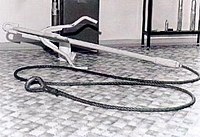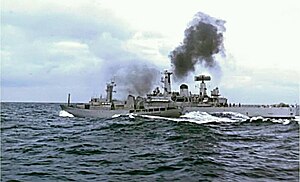Third Cod War
| First Cod War | |||||||||
|---|---|---|---|---|---|---|---|---|---|
| Part of the Cod Wars | |||||||||
 Coventry City and ICGV Albert off the Westfjords |
|||||||||
|
|||||||||
| States involved | |||||||||
|
|
|||||||||
| Commanders and leaders | |||||||||
|
|
||||||||
| Strength | |||||||||
|
|
||||||||
| Casualties and losses | |||||||||
| None | |||||||||
| a 3 by February 1960. | |||||||||
| Second Cod War | |||||||||
|---|---|---|---|---|---|---|---|---|---|
| Part of the Cod Wars | |||||||||
 A net cutter, first used in the Second Cod War |
|||||||||
|
|||||||||
| States involved | |||||||||
|
|
|||||||||
| Commanders and leaders | |||||||||
|
|||||||||
| Strength | |||||||||
|
|
||||||||
| Casualties and losses | |||||||||
| 1 engineer killed | None | ||||||||
| Third Cod War | |||||||||
|---|---|---|---|---|---|---|---|---|---|
| Part of the Cod Wars | |||||||||
 Icelandic patrol ship ICGV Óðinn and British frigate HMS Scylla clash in the North Atlantic. |
|||||||||
|
|||||||||
| States involved | |||||||||
|
|
|||||||||
| Commanders and leaders | |||||||||
|
|||||||||
| Strength | |||||||||
|
|
||||||||
| Casualties and losses | |||||||||
| No casualties 5 patrol vessels damaged |
1 trawlerman wounded 15 frigates damaged 1 supply ship damaged |
||||||||
The Cod Wars (Icelandic: Þorskastríðin, "the cod strife", or Landhelgisstríðin, "the war for the territorial waters") were a series of confrontations between the United Kingdom and Iceland regarding fishing rights in the North Atlantic. Each of the disputes ended with Iceland's victory. The final Cod War concluded in 1976 with a highly favourable agreement for Iceland, as the United Kingdom conceded to a 200-nautical-mile (370-kilometre) Icelandic exclusive fishery zone following threats that Iceland would withdraw from NATO, which would have forfeited NATO's access to most of the GIUK gap, a critical anti-submarine warfare chokepoint during the Cold War. As a result, British fishing communities lost access to rich areas and were devastated, with thousands of jobs lost. Since 1982, a 200-nautical-mile (370-kilometre) exclusive economic zone has been the United Nations standard.
The term "cod war" was coined by a British journalist in early September 1958. None of the Cod Wars meets any of the common thresholds for a conventional war, though, and they may more accurately be described as militarized interstate disputes. There is only one confirmed death during the Cod Wars: an Icelandic engineer accidentally killed in the Second Cod War while repairing damages on an Icelandic gunboat.
A variety of explanations for the occurrence of the Cod Wars have been put forward. Recent studies have focused on the underlying economic, legal and strategic drivers for Iceland and the United Kingdom and the domestic and international factors that contributed to the escalation into a dispute. Lessons drawn from the Cod Wars have been applied to international relations theory.
Fishermen from the British Isles began to fish in international waters near Iceland in and around 1400. From the early 16th century onwards, English sailors and fishermen were a major presence in the waters off Iceland.
...
Wikipedia
